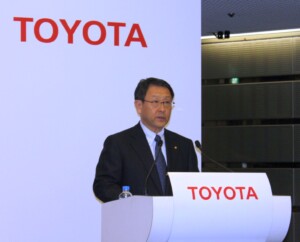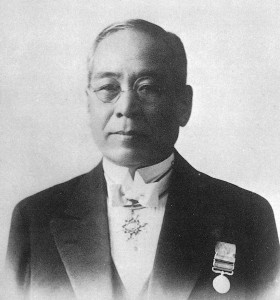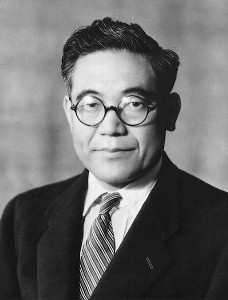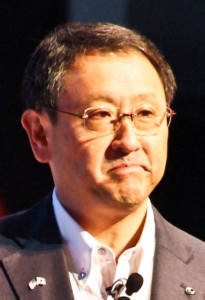 Somewhat surprising to industry insiders, the CEO of Toyota Motor, Akio Toyoda, announced on January 26 his resignation, and he will step down as CEO on April 1, 2023, to become the chairman of the board. Hence, I will have a look at his impact on Toyota. However, just to be warned, if you expect glowing praise, you should look elsewhere. I believe he changed Toyota, a company I love, in a worrisome way. I am definitely not a fan of his work. Granted, being a CEO is not easy, and he did have to lead Toyota through a couple of crises (Recall,s Corona, etc.). Compared to other CEO’s, he is probably somewhere around average. But I believe he had a negative influence on the Toyota corporate culture.
Somewhat surprising to industry insiders, the CEO of Toyota Motor, Akio Toyoda, announced on January 26 his resignation, and he will step down as CEO on April 1, 2023, to become the chairman of the board. Hence, I will have a look at his impact on Toyota. However, just to be warned, if you expect glowing praise, you should look elsewhere. I believe he changed Toyota, a company I love, in a worrisome way. I am definitely not a fan of his work. Granted, being a CEO is not easy, and he did have to lead Toyota through a couple of crises (Recall,s Corona, etc.). Compared to other CEO’s, he is probably somewhere around average. But I believe he had a negative influence on the Toyota corporate culture.
Introduction


Akio Toyoda (豊田章男) is the great-grandson of Sakichi Toyoda, founder of Toyota Automatic Loom, and the grandson of Kiichiro Toyoda, founder of Toyota Motor. He was born on May 3, 1956. He studied law at Keio University (where I was a guest professor during my sabbatical), and finance at Babson College. Afterward he worked as a banker in the USA.
He joined Toyota in 1984. Supposedly his father advised him against it, saying, “There is no one at Toyota today who would want to have [Akio] as a subordinate” (source). At one point he even was demoted from assistant manager to regular employee (source).
Aided by his family name, he joined the board of directors in 2000, became executive vice president in 2005, and finally president of the company in June 2009. He will step down as CEO on April 1, 2023, to become the chairman of the board. Strangely enough, this announcement was not made at an official press conference, but on the Toyota Times YouTube channel, where reporters could not ask questions, even with the usually extremely timid Japanese press that always risks losing its membership to the Japanese press club if the news is not pleasing enough.
Changes in Toyota Top-Level Management
 Akio Toyoda made large and fundamental changes in the leadership of Toyota. He was demoting or removing many directors (from 27 to 9 in multiple steps) and vice presidents, and removing many advisors (from 67 to 9), including former presidents (source). People who were critical of Akio resigned (some say less-than voluntary), including one of the few foreign vice presidents, Didier Leroy (source). This will consolidate power with Akio, so “no one can stop Mr. Akio’s recklessness any longer” (source).
Akio Toyoda made large and fundamental changes in the leadership of Toyota. He was demoting or removing many directors (from 27 to 9 in multiple steps) and vice presidents, and removing many advisors (from 67 to 9), including former presidents (source). People who were critical of Akio resigned (some say less-than voluntary), including one of the few foreign vice presidents, Didier Leroy (source). This will consolidate power with Akio, so “no one can stop Mr. Akio’s recklessness any longer” (source).
It seems, it was also Akio’s intention to promote his son Daisuke (豊田大輔, born April 5, 1988), who was more-or-less pushed into an executive position, and is currently senior vice president of TRI-AD, Toyota’s self-driving technology development subsidiary (source). Even though the Toyota family holds only around 1% of the shares of Toyota (source), they still have a dominating control over the company. Insiders believed that Akio wanted to install him as the next CEO, running the publicly owned company Toyota more like a hereditary kingdom (source). Insofar, it is surprising that Akio now hands over the CEO seat to Koji Sato (佐藤恒治, born October 19, 1969), up to now president of Lexus, the luxury brand of Toyota. Is this a change in direction, or merely an extra step to install his prince Daisuke?
Leadership Style
 There is also much criticism of his leadership style. It seems, Akio introduced the bad parts of Western leadership to Toyota, namely to eliminate anybody who disagrees with you. One article calls this “the tyranny of the naked king who does not listen to any complaints or criticism” (source). A contact of mine compared the situation in upper management to “North Korea.” While I have never myself met Akio in person, I have met with many who have seen his style. I have heard much criticism and little praise.
There is also much criticism of his leadership style. It seems, Akio introduced the bad parts of Western leadership to Toyota, namely to eliminate anybody who disagrees with you. One article calls this “the tyranny of the naked king who does not listen to any complaints or criticism” (source). A contact of mine compared the situation in upper management to “North Korea.” While I have never myself met Akio in person, I have met with many who have seen his style. I have heard much criticism and little praise.
For example, at one point I talked with a higher-ranking Denso manager. Denso is part of the Toyota group, and in my view the best company within the Toyota group, better than Toyota Motor. At one point we discussed information sharing between companies. He said that Denso shares information freely, including confidential information, but only with companies they trust. If they do not trust a company, they share only the absolute need-to-know necessary information. I then asked him if they trust Toyota Motor. He laughed and refused to answer…which for me was answer enough.
In my view, one of the strengths of the Toyota way was that employees did not fear to speak up, and could often influence upper management. This also seemed to change. Another contact of mine who frequently did business with many companies in the Toyota group told me his view of the differences between Denso (best), Toyota Motor (worst), and the rest of the Toyota group. If he approached his business partner at the Toyota group, proposing a project, and the business partner was worried that his superior wouldn’t agree,
- at Denso they said not to worry, they will convince their boss to change his mind.
- at other Toyota group companies they said this will be a problem, but they should wait until the superior position is rotated in a few years, and they will get the agreement from its successor.
- at Toyota Motor they said to just forget about it, it will never be approved.
I also have been told that at Toyota, they now hire more “selfish employees,” as they believe that they can stand up better to the more brusque Western business partners. I believe, however, that employees who put themselves before the company are not good for the company (albeit, companies often deserve them). In connection to this, another Denso manager also told me about exchange of people. When I was in the Toyota group (before Akio took over), it was common for employees of one company to have their desk at another company for months, exchanging information and deepening connections. They stopped that. Denso now tries to shield their employees as to not infect them with the in their view bad corporate culture that has developed at Toyota Motor.
Electric Vehicles… or Lack Thereof

One decision at Toyota that probably came from the very top and may be potentially problematic was to neglect fully electric vehicles and instead focus on hybrid electric and hydrogen fuel-cell-powered vehicles. When making business decisions, there is always the risk of a mistake, and I believe this was a mistake. Batteries continue to improve, and once they are good enough, there is no point for fossil fuels anymore. Nevertheless, Toyota pushed hybrid and hydrogen technology. Yet, on its own, Toyota is simply too small to establish a good hydrogen network. Toyota is definitely behind on electric vehicles (source). Electric vehicle sales are steadily increasing, and the Nissan Sakura is the most popular model in Japan, followed by Mercedes and Hyundai (source). Toyota launched its first fully electric vehicle, the oddly named bZ4X, only in 2022…just to have it recalled immediately “due to the possibility that wheels could come loose“. It sold only 232 vehicles in Q1–Q3 2022 (Source: Kelly Blue Book Q3 2022 sales report), which is just pitiful. Worldwide best seller in 2022 was the Tesla Model Y with around 200 000 units. Toyota was ranked as #36 out of 42 fully electric models with a market share of 0.04%. The hydrogen-fueled Mirai is not selling well either, with only 1437 vehicles in Q1–Q3 2022. Toyota does, however, have an almost 50% market share on hybrids. Yet, by neglecting fully electric cars, Toyota is missing a major change in the industry, and this mistake will hurt Toyota a lot in the next few years. Long gone are the days of the Prius, when Toyota led the automotive industry.
Summary
It is hard to improve a corporate culture, and it is much easier to wear it down. In my opinion, Akio had and will continue to have a negative influence on the Toyota corporate culture. He is doing to Toyota what McDonnell Douglas did to Boeing. I do hope the new CEO, Koji Sato, can stop this trend, but the view at Toyota is that Sato will not change the decision-making style but instead continue as a protege of Akio. Even worse, with kind-of two bosses, “the decision-making structure will become complicated and the speed will slow down“ (source). With reference to the former US president, “Toyota and Mr. Akio Toyoda are beginning to ‘trump’” (source). I am a big fan of Toyota and its Toyota production system, but these developments worry me immensely. I am sure Akio also has his good sides (he is apparently a pretty good race car driver), and running a large company like Toyota is by no means easy. However, I have my doubts about him as a industry leader. Toyota is (was?) in my view one of the best managed companies in the world, but I fear it slipping down to merely average. Now, go out, improve and foster the culture at your workplace, and organize your industry!
Selected Sources
I used a lot of external sources for this article, many of which are in Japanese.
- 河村靖史: トヨタ“裸の王様”章男社長の独裁、社員が辟易…囁かれる息子の世襲、会社私物化批判も , Business Journal 14.03.2020 (Yasushi Kawamura: Employees are fed up with the dictatorship of Akio, the “Naked King” of Toyota… His son has taken over the reins of the company, and there is criticism that he has privatized the company.)
- 河村靖史:トヨタ「異例」の社長交代 世界的EVシフトに対応 河村靖史, Weekly Economist Mainichi (Yasushi Kawamura: Toyota’s “unusual” change of president Responding to the global EV shift Yasushi Kawamura)
- 井上 久男:トヨタが中国企業に「敗北」する日がやってくる…日本の基幹産業を襲う「悲劇的な結末」, Gendai Media, 24.01.2023 (Hisao Inoue: The day will come when Toyota will be “defeated” by a Chinese company… “Tragic consequences” to hit Japan’s key industry.)
- 井上 久男:トヨタが「世界一」から転落し、日本の自動車産業の「ヤバすぎる大崩壊」が始まる…!, Gendai Media, 24.01.2023 (Hisao Inoue:Toyota’s fall from “world number one” marks the beginning of the “too-bad-to-be-true collapse” of the Japanese auto industry…!)
- 井上 久男:これは「院政」の始まりか…トヨタ社長交代、95分の「トヨタイムズ」映像で見えた「決定的な異変」, Gendai Media, 30.01.2023 (Hisao Inoue: Is this the beginning of the “House of Representatives” administration… Toyota’s presidential change, the “decisive change” seen in the 95-minute “Toyotimes” video.)
- Peter Johnson: Toyota ramping up bZ4X SUV production to compete in swelling EV market, but not anytime soon, Electrec Oct. 26 2022
- 豊田章男 (Japanese Wikipedia Article on Akio Toyoda)
- 【緊急生放送】豊田章男が次期社長 佐藤恒治に託した想い|トヨタイムズ (【Emergency Live Broadcast] Akio Toyoda’s Thoughts on Koji Sato, President-Elect|Toyotimes), Toyota Times Youtube announcement of change of CEO.

Wow interesting and insightful post. Thank you 🙂
Having worked inside of Toyota at Georgetown, I believe that mutual trust and respect is the key process for progress. From what i have read it is being dismanteled. It is to Toyota’s disadvantage. Trust is very fragile
Hi Christoph,
This write-up is definitely not good news… It certainly sounds as though you’re plugged into what’s happening within Toyota. Interestingly, this sort of negative news has not crossed my radar prior to reading your article. As such, the question arises as to what factor(s) might have precluded this sort of news leaking out elsewhere and earlier?
Based on what you’ve written, it seems clear that a company’s way of THINKING AND BEHAVING can be and is greatly influenced by the manifest ways of THINKING AND BEHAVING at the very top of the organization. That fact has been evidenced perennially – for many decades now – throughout the US auto manufacturers. It seems rare to encounter a CEO who is willing buck the demands of the financial markets and focus on meeting/exceeding customer needs and expectations. And, up until now, I believed that Toyota’s past would continue to define its future. BUT, it now seems that the PAST is only as robust as those in the PRESENT choose to make it.
Bottom line: Operational Excellence – on a worldwide stage – and the sort of persistent THINKING AND BEHAVING required to sustain it are actually pretty fragile. And one of the forces that seems to make OE more susceptible to decline is a mindset that favors short-term financial performance over serving CUSTOMERS in both the present and the foreseeable future.
Hi Jay, the problem lies with the freedom of the press in japan, or lack thereof. Japan press freedom is ranked 71st in the world out of 180, quite behind of most other democracies. The problem are the “press clubs”. To join any kind of press conference, the journalist/publication needs to be a member in an industry press club. Anyone writing undesired news gets kicked out…hence there are few undesired news. I source this article on two independent journalists, once I have met a few times myself, but even in Japan you have to look for such news. Critical voices rarely make it into english, either. If a company is not part of a press club, however, the gloves are off (e.g. Nintendo is not in a press club, hence the news is much harsher on them than the press club insider Sony).
Thank for your insight christoph! , as normal car & motorcycle guy ,too bad that public always rewards marketing and publicity more than engineering and integrity even first two will definitely get you killed , Tesla delivers products with questionable quality and bad customer support yet many people worship them as the great way forward , VW till this day still greenwashing themselves long after dieselgate hoax yet people praise them as EV savior.
I want to hear your opinion about present Honda , it seem like since post covid they tried to lean heavily towards engineering oriented again after two decades of being ruled by accountants , their current ceo toshihiro mibe is seem look opposite to akio and koiji.
As a student of The Toyota Way over the last 40 years I have been repeatedly impressed at how magically the right leader for the right times is selected as president. Like Okuda disrupted a lot of things being somewhat aggressive and pushing hard on the projects he believed in, though one was the Prius which worked out great. He seemed to disrupt the culture of respect for people. Then Fujio Cho comes in and brings the Toyota Way 2001 and Toyota Business Practices and more focusing on building the culture. I personally was excited when Akio Toyoda came in. A close colleague, Gary Convis, knew him well at NUMMI, and raved about his sincerity and humbleness, like putting a cot on the floor when there was a big breakdown of a stamping press. He could not do anything but he wanted to be there to support the team member. My optimism was exceeded when I saw first hand the wonderful job Akio did as president when time and time again he took a major crisis (recalls, Fujushima disaster, Thailand flooding, chip shortage) and masterfully managed through it, always trusting in the team members. I recall in the parts shortage following Fukushima he ordered his lieutentants to not ask questions of the people managing the recover. “If you want to know go to the obeya and see for yourself.” After the recall crisis he ordered every Toyota location to create their own quality center with the sources of information most critical of Toyota, pulling no punches, that everyone understands what happens when quality and communication slips. I can go on and on about his great leadership, humble leadership, respect for suppliers, respect for team members. He will be a very hard act to follow.
Hello Jeffrey, many thanks for your input. Toyota had a string of very good CEO’s. People I know in particular praised Fujio Cho. Unfortunately, Akio Toyoda breaks this string. As I am writing these lines, I am in Japan again, having talked to more people, including an Japanese University professor, a local consultant, and the director of the Japanese branch of an international company that supplies Toyota. They all agree with the assessment in this blog, and are worried that Akio damages the corporate culture of Toyota. I even got some more examples and anecdotes on him along the same lines. He may have managed some crises (besides these you mentioned also the break pedal issue and airbag recall), but overall I believe he hurt Toyota more than he helped.
Very Interesting! Thanks